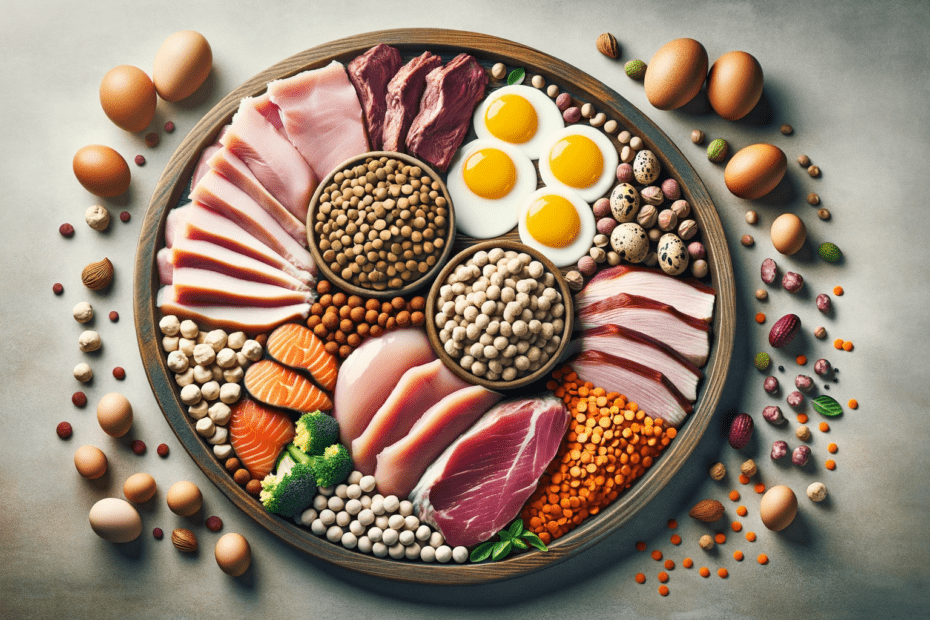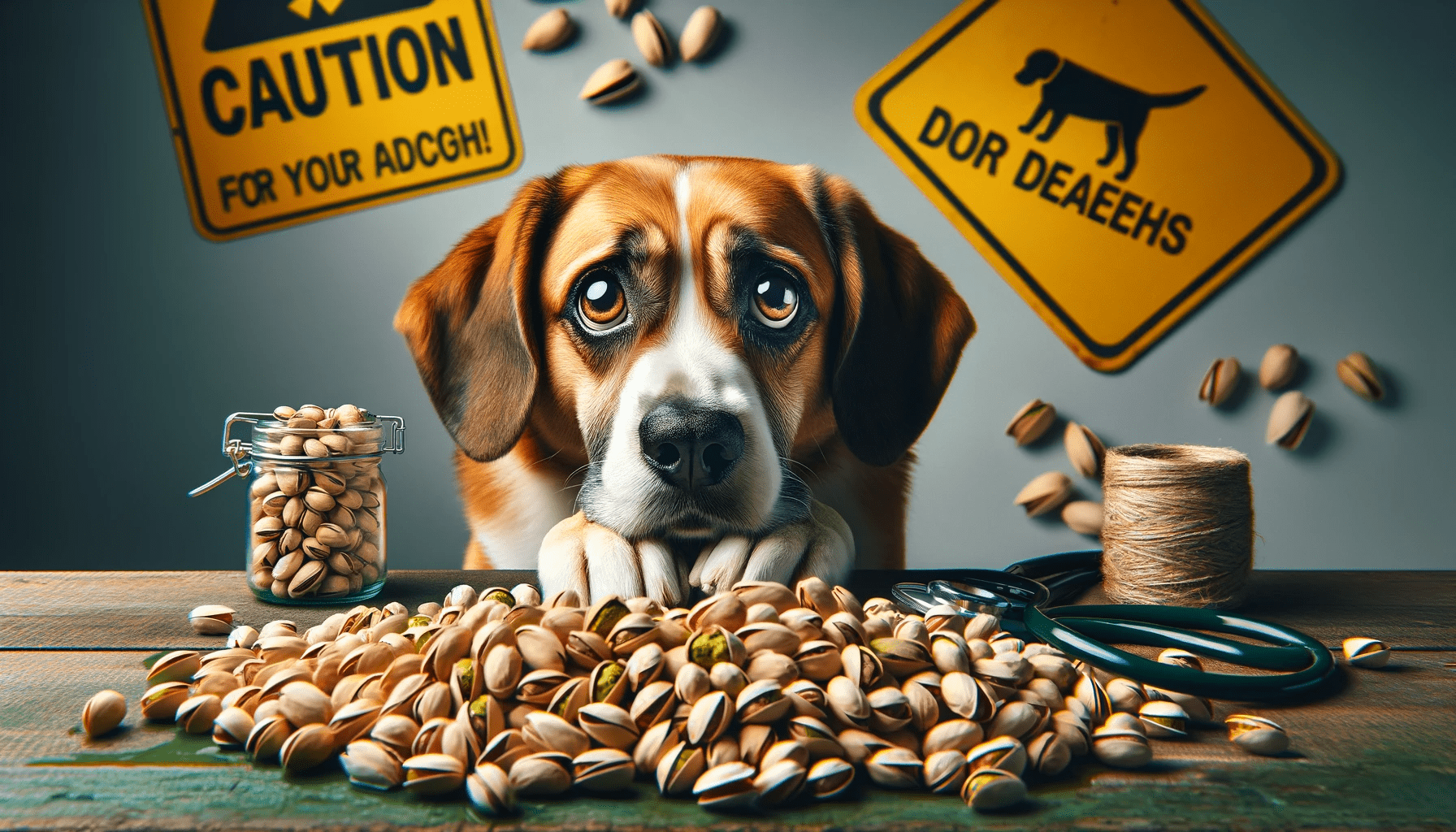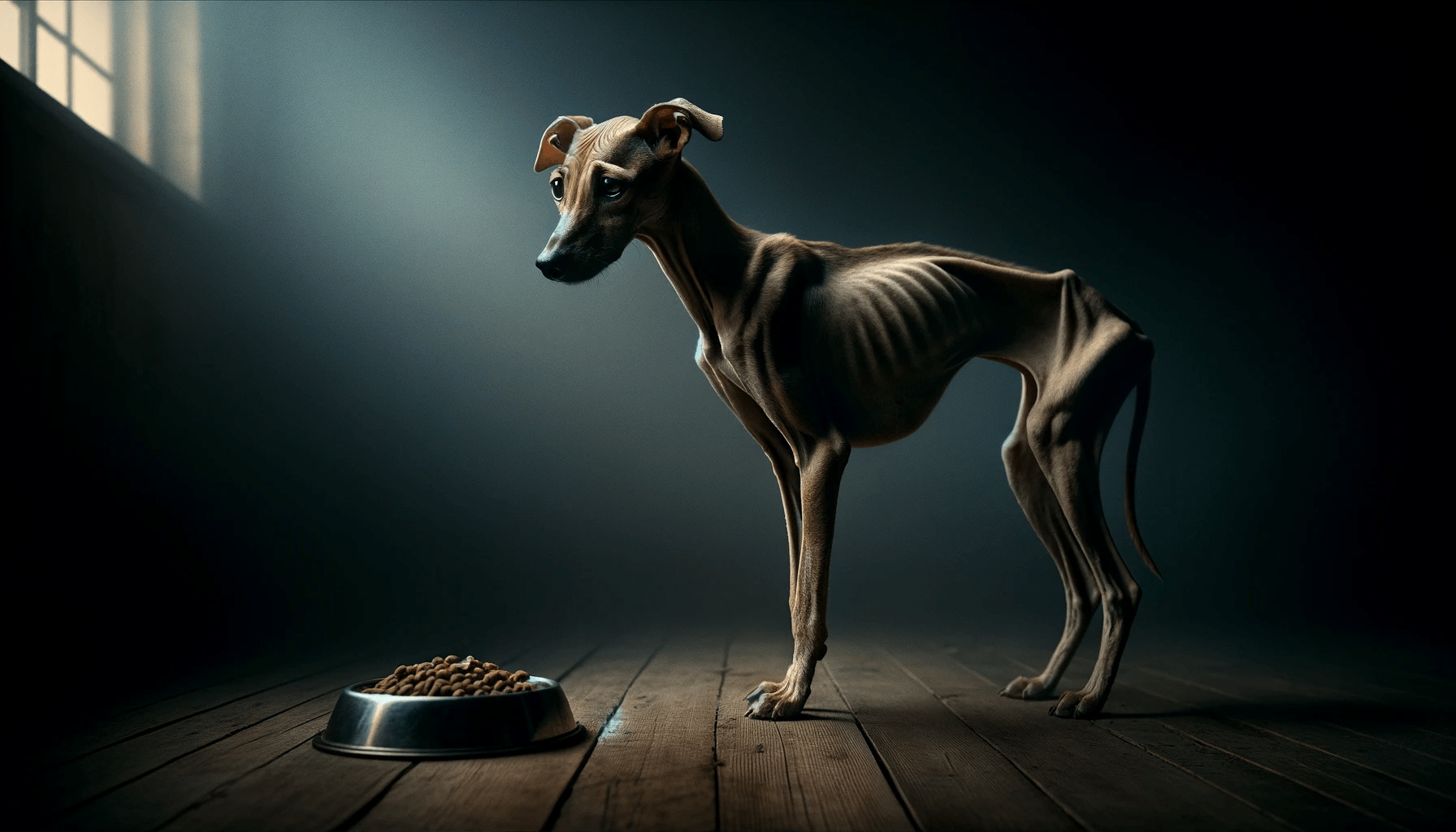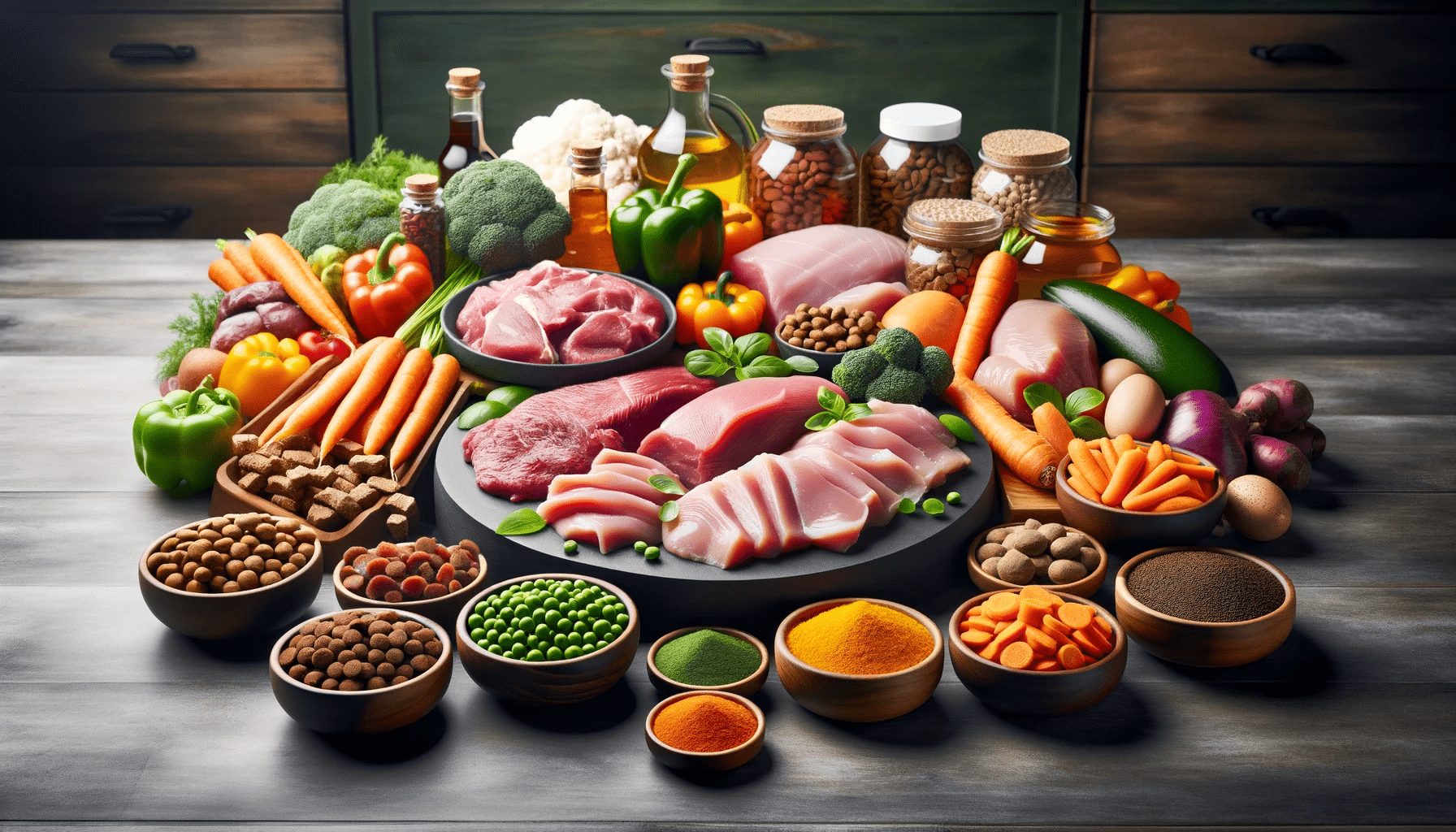Do you know why protein is crucial for your dog's nutrition?
Discover the importance of protein in this article.
Protein plays a vital role in muscle development, energy levels, a healthy coat, and immune function.
By understanding the significance of protein in your dog's diet, you can ensure they receive the necessary nutrients for optimal health and well-being.
Key Takeaways
- Protein is essential for dogs as it provides building blocks for bodily functions and supports muscle development.
- Protein requirements depend on factors such as size, age, activity level, and overall health.
- High-quality protein sources are ideal for muscle development and energy production.
- Protein plays a crucial role in weight management, maintaining a healthy coat, and boosting the immune system.
The Basics of Dog Nutrition
To understand the basics of dog nutrition, you need to know that a balanced diet includes a specific amount of proteins. Proteins are essential for dogs as they provide the building blocks for various bodily functions. When it comes to dog food options, there are many choices available in the market. These options range from commercial kibble and canned food to homemade diets. However, regardless of the type of food you choose, it's crucial to ensure that your dog's diet is well-balanced and provides all the necessary nutrients.
Proteins play a vital role in a dog's diet as they're responsible for the growth and repair of tissues, the production of enzymes and hormones, and the maintenance of a healthy immune system. They're made up of amino acids, which are the building blocks of proteins. Dogs require a specific balance of essential and non-essential amino acids in their diet. Essential amino acids can't be synthesized by the dog's body and must be obtained from their diet.
Common nutrient deficiencies in dogs can occur when their diet lacks sufficient proteins. This can lead to various health issues, including poor growth, muscle wasting, skin problems, and a weakened immune system. Therefore, it's important to choose dog food options that provide an adequate amount of proteins to meet their nutritional needs. Consulting with a veterinarian can help determine the appropriate amount and type of protein for your dog's specific needs.
Understanding Protein Requirements
To understand your dog's protein requirements, it's important to consider their size, age, activity level, and overall health. Different dogs have different protein needs, and meeting these requirements is crucial for their overall well-being.
Here are three factors that influence your dog's protein requirements:
- Size: Larger dogs generally require more protein than smaller dogs. This is because they have more muscle mass to maintain and support, requiring a higher protein intake for proper muscle development.
- Age: Puppies and young dogs have higher protein requirements compared to adult and senior dogs. Protein is essential for their growth and development, helping to build strong muscles, tissues, and organs.
- Activity Level: Dogs with high activity levels, such as working dogs or those involved in agility training, require more protein to support their energy needs and muscle repair. On the other hand, less active dogs may require a lower protein intake to prevent weight gain.
Meeting your dog's protein requirements is crucial for their overall health and proper muscle development. Consult with your veterinarian to determine the appropriate protein levels for your dog's specific needs. Providing a balanced and nutritious diet that meets their protein requirements will help ensure their optimal health and well-being.
Protein's Role in Muscle Development
Protein plays a crucial role in muscle development in dogs. When dogs engage in physical activity, their muscles undergo stress and damage, and protein is necessary for the repair and growth of these muscles.
Essential amino acids, which are obtained from dietary protein, are particularly important as they can't be synthesized by the dog's body. Ensuring an optimal protein intake is essential for supporting muscle development and maintaining overall health in dogs.
Muscle Growth and Repair
You need adequate protein in your dog's diet to support muscle growth and repair. Protein is essential for muscle recovery and plays a crucial role in protein synthesis, the process by which the body builds new muscle tissue. Here are three important aspects of muscle growth and repair that protein helps facilitate:
- Muscle tissue repair: When your dog engages in physical activity, such as exercise or play, the muscle fibers undergo microscopic damage. Protein is needed to repair and rebuild these damaged muscle tissues, ensuring optimal muscle function.
- Muscle growth: Protein provides the necessary building blocks, called amino acids, for muscle growth. It helps promote and support the development of lean muscle mass, resulting in a stronger and healthier physique for your dog.
- Muscle strength and endurance: Protein also contributes to muscle strength and endurance. It helps improve muscle strength by enhancing muscle fiber thickness and increasing the number of contractile proteins within the muscle cells. Additionally, protein aids in the production of energy, allowing muscles to sustain activity for longer periods.
Essential Amino Acids
Including the right amount of protein in your dog's diet is crucial for their muscle development. Protein provides essential amino acids that play a vital role in building and maintaining muscle tissue. Essential amino acids are those that can't be synthesized by the dog's body and must be obtained through their diet. These amino acids are the building blocks of proteins, which are essential for protein synthesis.
Protein synthesis is the process by which new proteins are formed in the body, including the muscles. During muscle development, protein synthesis is essential as it allows for the repair and growth of muscle tissues. Without sufficient intake of essential amino acids through protein-rich food, your dog may experience muscle weakness and a hindered ability to repair and build muscle.
Therefore, ensuring that your dog receives an adequate amount of protein in their diet is vital for their overall muscle development.
Optimal Protein Intake
To ensure optimal muscle development in your dog, it's important to incorporate protein into their diet in the right amount. Protein is essential for muscle growth and repair, and a lack of protein can lead to muscle weakness and atrophy.
Here are three key factors to consider when it comes to optimal protein intake for your dog:
- Optimal protein sources: High-quality protein sources such as lean meats, fish, eggs, and dairy products are ideal for providing the necessary amino acids for muscle development. These sources contain complete proteins that are easily digestible and provide all the essential amino acids.
- Protein digestion: Dogs have specific digestive enzymes that help break down and absorb protein efficiently. However, it's important to ensure that the protein is properly cooked or processed, as raw or undercooked protein can be difficult to digest and may carry potential health risks.
- Quantity: The amount of protein your dog needs will depend on factors such as their age, size, activity level, and overall health. It's best to consult with your veterinarian to determine the optimal protein intake for your dog and adjust their diet accordingly.
Protein's Impact on Energy Levels
Protein directly affects your dog's energy levels. It plays a crucial role in your dog's metabolism, which is the process by which the body converts food into energy. Protein is made up of amino acids, which are the building blocks of muscles, tissues, and organs. When your dog consumes protein, it's broken down into amino acids and absorbed into the bloodstream. These amino acids are then used by the body to repair and build tissues, but they also have an impact on energy levels.
Protein's effect on metabolism is twofold. Firstly, protein has a thermogenic effect, meaning that it requires more energy to digest and metabolize compared to other nutrients like carbohydrates and fats. This increased energy expenditure can contribute to a higher metabolic rate and, consequently, more energy for your dog.
Secondly, protein plays a crucial role in weight management. It has a satiating effect, meaning that it helps to keep your dog feeling full and satisfied. This can be particularly important for dogs that are trying to lose weight or maintain a healthy weight. By including protein-rich foods in your dog's diet, you can help regulate their appetite and prevent overeating, which can lead to weight gain and low energy levels.
Protein's Contribution to a Healthy Coat
Protein plays a crucial role in maintaining a healthy coat for your furry friend. Here are three ways in which protein contributes to healthy skin and shiny fur:
- Promotes Hair Growth: Protein is essential for the growth and development of hair follicles. It provides the necessary building blocks for keratin, a protein that makes up the structure of hair. Adequate protein intake ensures that your dog's hair grows strong, thick, and healthy.
- Supports Skin Health: Protein is involved in the production of collagen, a protein that gives structure and elasticity to the skin. It helps to maintain the integrity of the skin barrier, preventing dryness, flakiness, and irritation. A diet rich in protein promotes healthy skin, reducing the risk of skin infections and allergies.
- Enhances Coat Luster: Protein-rich diets contribute to a shiny and lustrous coat. Proteins contain amino acids, which are necessary for the synthesis of melanin, the pigment responsible for coat color. Adequate protein intake ensures that your dog's coat remains vibrant and glossy.
Protein's Importance for Immune Function
Protein plays a crucial role in supporting your dog's immune system. Adequate protein intake is essential for boosting immune function, helping to prevent illness and infection.
Boosting Immune System
Boost your dog's immune system with the essential nutrients found in a protein-rich diet. Protein plays a crucial role in maintaining and boosting the immune system, helping your furry friend stay healthy and strong.
Here are three ways protein enhances your dog's immune function:
- Supports Antibody Production: Protein provides the building blocks for antibody production, which are essential for fighting off infections and harmful pathogens.
- Strengthens Cell Function: Proteins are involved in various cellular processes, including cell signaling and communication. A strong immune system relies on healthy cells that can effectively identify and eliminate foreign substances.
- Repairs and Regenerates Tissues: Protein is necessary for tissue repair and regeneration, ensuring that the immune system can quickly recover from any damage or injury.
Preventing Illness and Infection
To prevent illness and infection, it's important to understand the role protein plays in your dog's immune function.
Protein is crucial for immune support, as it provides the building blocks for antibodies and immune cells. These components of the immune system help your dog fight off pathogens and protect against diseases.
Additionally, protein plays a key role in the production of cytokines, which are signaling molecules that regulate immune responses.
A deficiency in protein can weaken your dog's immune system, making them more susceptible to infections and illnesses.
It's essential to provide your dog with a balanced diet that includes high-quality protein sources to maintain a strong immune system and promote overall health.
Frequently Asked Questions
Can Dogs Get Enough Protein From Plant-Based Sources?
Dogs can't get enough protein from plant-based sources alone. Animal-based proteins provide essential amino acids that dogs need for optimal health. Protein deficiency can lead to various health risks in dogs.
How Much Protein Does a Dog Need per Day?
To meet your dog's protein needs, it's important to provide them with high-quality protein sources. The amount of protein needed per day depends on factors like age, size, and activity level.
Are All Protein Sources Equally Beneficial for Dogs?
Not all protein sources are equally beneficial for dogs. While vegetarian options can provide some protein, meat-based sources are more suitable for their muscle development and overall nutritional needs.
Can a Dog Have Too Much Protein in Their Diet?
Having too much protein in a dog's diet can be detrimental. It can lead to kidney damage and other health issues. It's important to meet your dog's protein requirements with balanced protein sources for optimal nutrition.
Are There Any Signs of Protein Deficiency in Dogs?
Signs of protein deficiency in dogs include weight loss, muscle wasting, and a dull coat. Without enough protein, dogs may also experience weakened immune function and slower wound healing. These health risks highlight the importance of protein in dog nutrition.
Conclusion
In conclusion, protein plays a crucial role in dog nutrition. It's essential for muscle development, providing energy, maintaining a healthy coat, and supporting immune function.
Meeting the protein requirements of dogs is vital for their overall health and well-being. As responsible pet owners, it's important to ensure that our furry friends receive a balanced diet that includes an adequate amount of high-quality protein sources.






